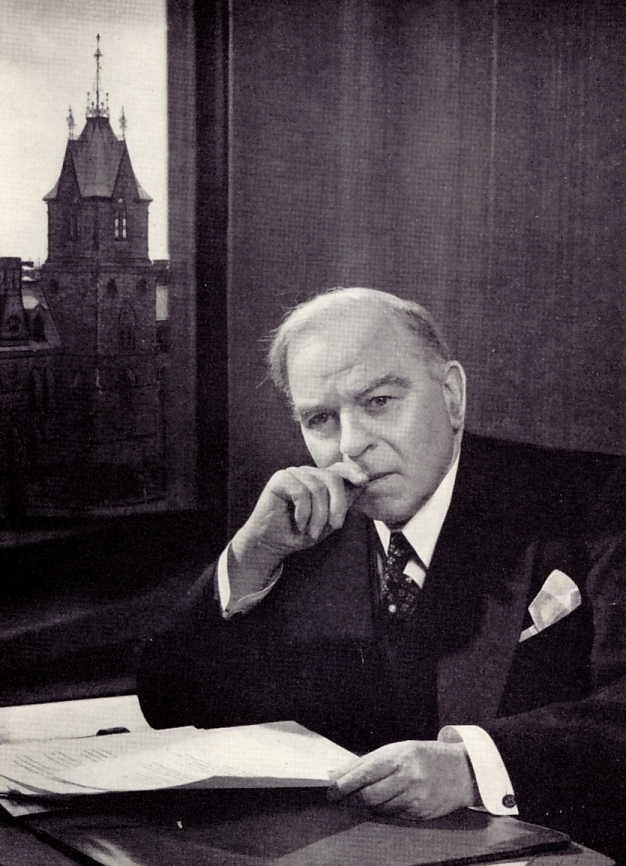Mackenzie King or R.B. Bennett
The burden of economic challenges of the Great depression in the 1920's and the 1930's were on shoulders of the new generation of political leaders. The two new political leaders who were in power during the tumultuous times are Mackenzie King and R.B. Bennett. Mackenzie King was the grandson of William Lyon Mackenzie the fiery reformer. He became the new Liberal leader in 1919 as Sir Wilfrid Laurier died shortly after World War 1. He was an expert labor negotiator , skilled at using compromise, and knew the importance of the national unity ahead of political goals. He is known to be the longest serving prime minister in Canada, beginning in 1921, he held the power in 1925, 1926, 1935, 1940 and 1945. R.B Bennett held the power from 1930 to 1935. As a business man, he believed that if the businesses survive and grow, they would be able to provide jobs for workers, provide them enough wages to buy their products, as a result, stimulating more business growth and upward spiral of employment and production to save the nation from the terrible depression. The question that arise here is who was a better leader and what aspects of him made him more outstanding than the other?
First, let`s look at what Mackenzie King has done after his victory in the 1921 election. As he came in to power, the Progressive Party had emerged as a national party representing the interests of farmers, however the Progressive Party lacked a unified platform and Mackenzie King lure the progressives to the Liberal by lowering tariffs on farm machinery and equipment and by reducing the freight costs for gain shipments, which had been suspended during World War1(the Crow Rate). In 1920, the Maritimes Rights Movement was launched my numerous people who believed that Canada was responsible for any region that was economically disadvantaged due to its geographic location. However their demands were not granted because Mackenzie King did not want to lose his votes from the Western provinces. Discouraged by the support from the government, Maritimes Rights Movement disbanded in 1926. King believed that the depression was just a temporary crash caused by the business cycle and when the provincial governments asked for help for unemployment, he responded with the famous five cent speech that his government would not even provide them a five cent. He was accused unable to deal with the depression.
Bennett won the election in 1930 and Canada was in his hands. He tried to raise the production and unemployment rate by higher the tariff to protect the Canadian business from other companies, however exporting industries were not helped by the high tariffs. He created relief camps for the numerous homeless and single men known as transients. instead of wandering in the cities, the camps provided them shelters, food, clothing and twenty cents a day for building bridges, roads, cutting trees and dugging ditches. Despite the government's effort to support them, they were disillusioned by the lives in the relief camps and they demanded for more. Bennett also suggested the New Deal which included the regulation of hours of work, minimum wage, improvement of working conditions, employment, industrial accident,s insurance against sickness. However, those were also not appreciated by the citizens because many were already employed and they viewed the new deal as Bennett's desperate effort to win the next election.

 It is a fact that the time that King and Bennett had power was a period of challenge and depression. King and Bennett belonged to different parties, however they had the same intention and goal which was to save Canada from the depression and make its economy stronger. However, I personally think that Bennett was a better prime minister because even though King had outstanding skills to work though problems with national unity, he did not believe in depression and he thought that the economic struggle was temporary and that the economy will recover on its own. In contrast, Bennett tried many ways solve the problems and save Canada from the depression. Even though his efforts were not greatly appreciated by the people, I think that his non-stopping suggestions and efforts deserve some respect and gratitude.
It is a fact that the time that King and Bennett had power was a period of challenge and depression. King and Bennett belonged to different parties, however they had the same intention and goal which was to save Canada from the depression and make its economy stronger. However, I personally think that Bennett was a better prime minister because even though King had outstanding skills to work though problems with national unity, he did not believe in depression and he thought that the economic struggle was temporary and that the economy will recover on its own. In contrast, Bennett tried many ways solve the problems and save Canada from the depression. Even though his efforts were not greatly appreciated by the people, I think that his non-stopping suggestions and efforts deserve some respect and gratitude.
No comments:
Post a Comment